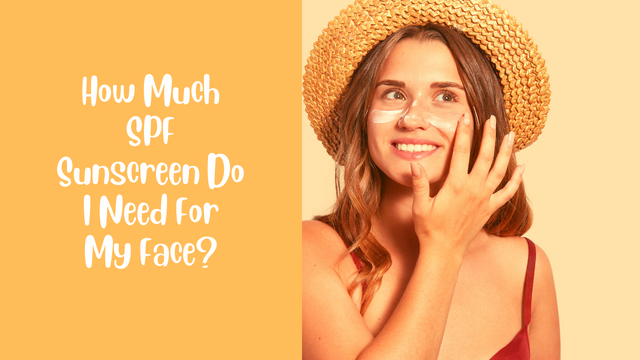How Much SPF Sunscreen Do I Need For My Face?
SPF is referred to as sun protection factor or in simple terms the amount of UV radiation required to burn out protective skin when directly exposed to sun for a long time. UVB damages the upper layer of the skin whereas UVA dive deep into the inner dermal layers of skin which further results in various skin diseases like rashes, skin cancer, premature ageing, tanning, acne etc. But by applying SPF sunscreen, one can avoid these harms to a great extent. There are some myths that dark-toned skin doesn't require sunscreen but this is not affirmative. Dark skin contains melanin which protects one from UV damage to some extent but doesn't protect them from UVA rays. Therefore, sunscreen is recommended for every skin whenever it is directly exposed to the sun. Sun exposure doesn't depend on the weather, even in winters, direct sun exposure can cause skin-related diseases.
How Much SPF is Needed For My Skin?
Let’s take this as an example, considering that your skin requires 10 minutes to burn without sunscreen. A sunscreen with SPF 30 will protect your skin for (10 minutes X factor 30) 300 minutes from UV radiation. However, skin specialists recommend the use of sunscreen after every 120 minutes. Talking about the quantity, up to one ounce of sunscreen is generally enough to cover your whole body that is exposed to the sun.
The SPF number mentioned on sunscreen also tells us what percentage of harmful rays will be absorbed by that particular product. An SPF15 sunscreen absorbs about 93% of the UVB rays, SPF30 sunscreen absorbs 97%, and SPF50 can absorb about 98%. And there is no sunscreen that absorbs 100% of these UVB rays, so even if any product claims that, it won't be true.
How To Apply SPF Sunscreen?
Sunscreen is mostly available in lotions, creams, and gels. It should be applied to all body parts which will be in direct exposure to the sun. Skin experts recommend applying sunscreen 30 minutes before exposure to sunlight and re-applying it after every 120 minutes.
Several water-resistant sunscreens are also available which last for about 40 minutes. So whenever you are on your way for swimming or water-related activities make sure to re-apply for it after 40 minutes and just after completing your activity.
Conclusion
In the end, we would recommend sunscreen for everyone as it helps in reducing the chances of aging, tanning, skin cancer, and various skin-related diseases by protecting our skin from harmful rays like UVA and UVB. Sun exposure can even be in cold weather and for dark skin tone also but we have a solution and that's sunscreen. Just keep in mind that no SPF sunscreen absorbs 100% of UVB rays, so don't just go with any such claim.



